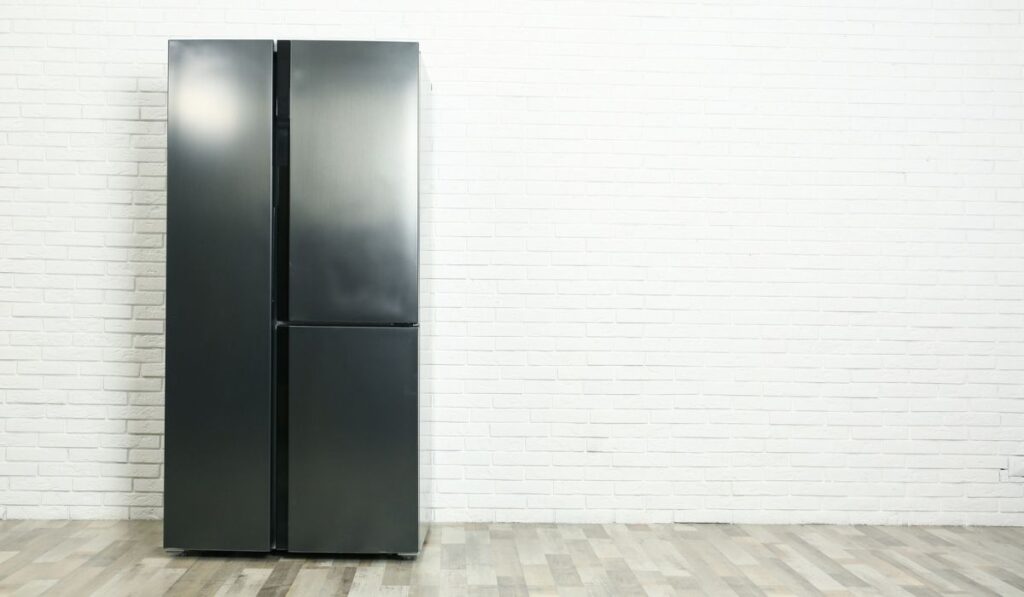Most of the time, when families trade in the ancient relic of a fridge for something new, you’ll see the old one is still used sparingly in the garage. If you paused to give it some thought and you want to know more before you join this trend, then you’re in the right place.
You can use a refrigerator in your garage if you live in a place with moderate temperatures. If there’s extreme heat or cold, bring your fridge inside during hot/cold months or consider buying an outdoor fridge. You can also buy an older model to use outdoors and keep your newer model inside.
That’s not to say that you can’t keep your fridge in that area of your house. Yes, you can do that, but there are some key things you need to pay attention to before you do. Read on to find everything you need to know about keeping your fridge in the garage.
Can You Use a Refrigerator in Your Garage?

Although the ideal place to keep a refrigerator is in the kitchen, sometimes, you might not have any choice but to place it somewhere else. That somewhere could be your garage, especially if it has enough space to accommodate the appliance.
Yes, you can use a refrigerator in your garage, but you have to remember that your fridge needs to be placed in a dry, cool, and flat place. That means that you should be mindful of the climates you live in.
Extreme cold climates may cause your refrigerator to stop working, while the compressor in your fridge might have to work overtime to keep your food cold in extremely hot climates.
The point is to only keep your fridge in the garage when the temperature is moderate. Consider taking the appliance inside when the weather becomes unfavorable.
Does Your Garage Need to Be Insulated?
Fridges will be exposed to higher/lower temperatures in garages that aren’t insulated.
This won’t be an issue if the temperature in your area is moderate. However, once the temperature drops or increases, your refrigerator will have to work overtime to create a balance.
A hot climate will force the compressor to run endlessly to maintain the compartment at a freezing temperature. As a result, the refrigerator will use more energy and wear down its parts faster.
Additionally, if you put something in the freezer at this time, it may take longer for it to freeze.
The compressor in a refrigerator will switch on and off more often in cold climates. This is because it’s attempting to balance the effect of the chilly weather outside with the temperature inside the refrigerator.
If this happens, frozen food may defrost more quickly than you’d like. Also, it might become too cold for the thermostat to work, causing the refrigerator not to come on at all.
To avoid either of these things happening, you might want to consider insulating your garage or taking the appliance in when the temperature moves towards the extreme.
How Can You Keep Your Garage Refrigerator Working?

Follow the tips below to keep your garage refrigerator working in tip-top shape.
Keep Your Garage Insulated
Insulating your garage is a sure-fire way to keep your fridge working so that you won’t have to worry about moving your appliance inside during extreme weather.
Insulation will improve the temperature in the garage, and if you can’t insulate the entire garage, you can work on just the walls.
You can also create a small panel for your fridge and insulate that area using wood and some insulation material. Proper insulation will protect your fridge from both hot and cold climates.
Protect Your Fridge
Outside in the garage, your refrigerator is exposed to dust, debris, and even flammable items. If you aren’t careful, your fridge might be damaged by any of these and become unable to function properly.
Keep your garage clean, particularly the area surrounding your refrigerator to prevent the debris from getting into the appliance’s exterior components.
Also, ensure that all flammable materials are kept far away from the fridge, as proximity can trigger a fire outbreak.
Keep Your Refrigerator Full
Your appliance won’t need to put so much effort into keeping the temperature when it’s full, as there would be no room for warm or cool air to disturb the contents.
If you don’t have enough pantry items to fill the refrigerator, you can use a few gallons of water.
Consider Installing an Outdoor Fridge
Those who don’t want to insulate their garages to put a refrigerator there can purchase an outdoor fridge instead.
The models in this category are usually equipped with powerful compressors and other mechanisms that allow them to run for longer hours and work effectively no matter the temperature.
Their insulation is thicker, so they are less sensitive to changes in temperature.
An outdoor fridge may also be anti-corrosive, weatherproof, and UV-resistant. It is very important to have the first two qualities if you plan to keep your refrigerator in a garage where water might be present.
UV protection is helpful if the refrigerator is close to a window that receives direct sunlight.
However, it is important to determine whether you actually need an outdoor refrigerator before making an investment.
Additionally, you should check to make sure your outdoor refrigerator will work where you live since extreme weather conditions differ according to location.
Should You Use a New or Old Refrigerator in Your Garage?
Newer fridges are designed to be as efficient as possible, so they usually can’t handle varying environmental conditions.
However, sometimes warranties actually won’t cover any damage if the fridge is stored in a place like a garage. You should check the warranty if you’re buying one specifically for the garage.
You should consider putting an older model in your garage and moving the new refrigerator into your kitchen to avoid trouble.
